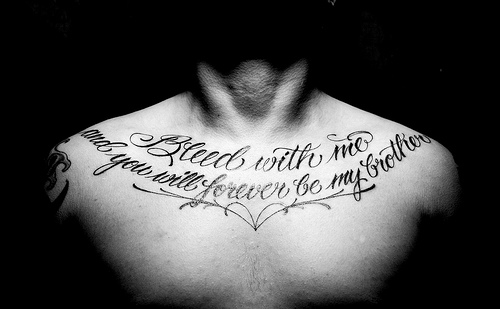A slender acquaintance with the world must convince every man that actions, not words, are the true criterion of the attachment of friends. – George Washington

"We few, we happy few, we band of brothers; For he today that sheds his blood with me Shall be my brother; be he ne'er so vile," ~ William Shakespeare, Henry V, A4, S3
What does that mean?
This quote is fairly typical of his day and age. Back then, you didn’t have strangers asking to be your friend on every Social Media site. You were expected to use the word friend very carefully. The word had a bit more solemn meaning, and wasn’t used commonly or casually, as it is today. Most of our ‘friends’ today would be considered acquaintances back then. Those people from the Social Media sites, they’d be considered strangers, as in reality, that’s what most of them are.
Someone who was called a friend would have certain expectations of how they would be treated, and how you would deal with them and their requests. Before attaining the status of friend, they would have to show their friendship by actions, not by words (or a ‘click here to be my friend’ button).
Also note that the quote uses the word ‘attachment’ in relation to the word ‘friend.’ In those days, there was an implied bond or obligation between friends. If you needed help, you would call on your friends, and could reasonably expect them to be there for you. You also were ready to be there for them, so you would hold them to as high a standard of effort and response as you hold yourself. Thus, friends were true and loyal, and expected to remain so for a very long time.
Why are actions important?
Actions, not words. That’s the true measure of how solid a friendship you have, so says the quote. Their actions will tell you how much of a friend they truly are. Everyone should be familiar with a saying similar to “It’s easy to talk the talk, harder to walk the walk.” This is the same basic thing.
Anyone can say that they are your friend, especially when you’re buying the drinks or throwing the party or are otherwise useful to them. The question is how will they act, or will their actions match their words? Will they be there for you when you need them, or will they be too busy, or otherwise indisposed?
Let’s turn it around for a moment, and consider the people you call friends and what you would do for them. Do your actions match your words? When was the last time you offered to help them, either when they asked explicitly or hinted that they might need some help? Are your actions keeping up with your words?
Where can I apply this in my life?
If you have spent any time doing Social Media games, you probably already have dozens, if not hundreds, of ‘friends’ to help you manage your goals. As a recovered Mafia Wars player, I dumped almost 1500 ‘friends’ when I quit the game. I try to be a little more selective when it comes to real friends, how about you? If someone you never met before walked up to you on the street and asked if they could be your friend, how would you react?
What if they had just scared off a mugger? Would their actions have spoken loudly enough to make their words fall more favorably on your ears? What actions do you expect of someone before you call them a friend? To me, this was a fairly difficult question to answer, as I have usually gone with a gut feeling, rather than any hard criteria. This was doubly confounding as this method has only failed me a handful of times.
There are different standards throughout the world. The definition, and therefore the expectations, attached to the word ‘friend’ will vary. Culture and tradition will also play a role. Some societies have specific words for different tiers of friendship, and each will have expectations for both words and actions that go with them.
Just as interesting, at least to me, is what are you willing to do to prove your friendship to someone else? Yes, it starts with words, but what action are you willing to consider to back them up? Yes, I understand, it will depend on the person, the intensity of feeling, the age and maturity of the relationship and probably a dozen other factors. The point was to get you thinking about something you may not have given much thought to in the past.
So, what do you think? Will you use the word ‘friend’ the same way in the future? Will you be more selective when letting people into that circle of your life? Will you come up with a new term (or re-purpose an old term) for your newly defined tiers of friendship? Will you have a ‘gang’ of closest friends, and a bunch of people you hang out with?
So many questions, but only you can answer them. I have really enjoyed thinking this one through. I hope to continue to see you here in the future. Perhaps one day we can call each other friends. Until next time, my fellow examiners, and remember to keep looking within.
From: Twitter, @arnoldgroup
confirmed at : http://www.brainyquote.com/quotes/quotes/g/georgewash146825.html
Photo by beau-foto
Happy Birthday, George Washington, born on 22 February 1732.
